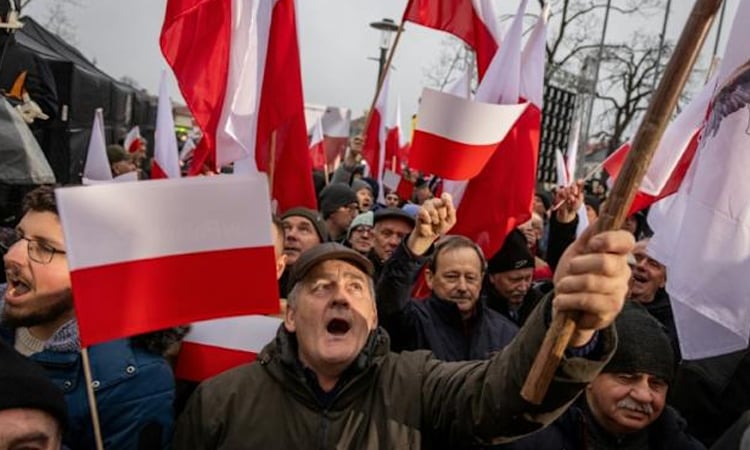News Flash
News Flash

WARSAW, May 12, 2025 (BSS/AFP) - Poland's presidential election, whose first round is on Sunday, could provide a boost for the governing centrists of the NATO and EU member or continue their difficult cohabitation with a conservative president.
Outgoing President Andrzej Duda, an ally of the main opposition party Law and Justice (PiS), has not been shy with using his veto since centrist Prime Minister Donald Tusk came to power in 2023.
Under Tusk's administration the country of 38 million people has tightened its cooperation with the European Union and cemented its staunch support of neighbouring Ukraine in the face of Russia's aggression.
With Duda winding down his second and final term in office, Tusk's Civic Coalition (KO) is hoping its candidate, pro-EU Warsaw mayor Rafal Trzaskowski, will win the presidential election.
Trzaskowski is currently the front-runner, with around 32 percent of the vote in the latest opinion polls.
Next up is nationalist historian Karol Nawrocki, backed by the PiS and Duda, who is polling at around 25 percent -- and who scored a White House visit with US President Donald Trump earlier this month.
Polling in third is Slawomir Mentzen, the candidate of the far-right Confederation party, who has around 14 percent of the vote in opinion surveys.
With no candidate on track to win more than 50 percent, Poland will likely have to hold a runoff on June 1 to decide who will succeed Duda.
The president in Poland has limited powers but is commander-in-chief of the armed forces, steers foreign policy and has the right to introduce and veto legislation.
- Difficult cohabitation -
Poland is currently in the midst of a difficult cohabitation between the centrist government and the president.
The head of state has vetoed some of the government's legislative initiatives, and he is also at odds with the governing coalition on Poland's judicial situation.
"At the macro level, the issue is Poland's role in geopolitics in general and more specifically in the European Union," said Ewa Marciniak, a political scientist at the University of Warsaw and head of the CBOS polling institute.
She told AFP that the election would decide whether there will be "a continuation of what the... (governing) coalition initiated in 2023 or a rupture of that narration".
Were Nawrocki to win, she said there would likely be a continuation of "this political conflict, polarisation, duopoly" that has characterised Duda's relationship with the government.
A Trzaskowski victory however would make it easier for Tusk's government to fulfil its campaign promises.
Unfulfilled pledges -- or ones carried out only in part or later than hoped for -- have left some voters disappointed in the government. These include women's rights supporters still waiting for changes to Poland's strict abortion laws.
- Migrants -
Key election issues include security, international relations, migration and social benefits for the hundreds of thousands of Ukrainians that Poland has welcomed since Russia invaded their country in 2022.
The top two candidates disagree on Poland's global partnerships.
Nawrocki has said Poland should focus primarily on the United States and NATO, while Trzaskowski insists on the importance of the European Union.
Trzaskowski argues in favour of "the continuation of the euro-Atlantic option but with a reinforcement of Europe's position in case the US impact diminishes significantly in the coming years", sociologist Stanislaw Mocek told AFP.
Nawrocki's meeting with Trump meanwhile has prompted accusations of election interference.
Mocek said Nawrocki displayed a "distrust of Europe" and France and Germany in particular.
The nationalist candidate has called for controls at the border with Germany, which he alleges is sending "illegal migrants" into Poland.
Mentzen, the far-right candidate, has taken the matter even further, saying that Poland should "arrest German police officers" who he claimed were depositing migrants on Polish territory.
Anti-migrant disinformation has been thriving for years in Poland, which has taken in large numbers of Ukrainian refugees since Russia's invasion in February 2022.
"What's new is that it is now combined with anti-German rhetoric, which feeds on anti-German and anti-European phobias," said Anna Mierzynska, an independent social media expert.